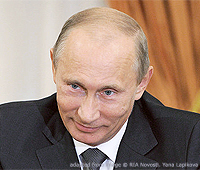Russian President Denies Trying To Resurrect USSR

(RIA Novosti – Dec. 10, 2012) President Vladimir Putin has rejected suggestions that Russia’s drive for closer ties with other former Soviet republics is an attempt to rebuild the Soviet Union.
Speaking on 10 December at a meeting in Moscow with his “authorized representatives”, who acted as his election agents during this year’s presidential election campaign, Putin dismissed such claims by “colleagues from abroad” as “nonsense”, Russian state news agency RIA Novosti reported.
On a visit to Dublin last week, US Secretary of State Hillary Clinton said that Russia was trying to “re-Sovietise the region” around it under the guise of various economic alliances.
However, Putin said that the integration of post-Soviet economies was a “natural process”.
“I find it very strange when I hear some colleagues from abroad say that our embarking on the path of integration amounts to Russia reviving its ambitions as the former Soviet Union (as received). What a nonsense. This is an absolutely natural process,” Putin said.
He added that the process was natural because the nations in question had “a common language”, “a largely common mentality”, and “common transport infrastructure and common energy infrastructure”.
He suggested that the current level of integration between former Soviet republics, or even their integration while they were part of the Soviet Union, was looser than that of the EU member states.
“I can give the example of the EU, where the number of decisions by the European Parliament that are mandatory is greater in percentage terms then the number of mandatory decisions by the former USSR Supreme Soviet. That is the degree of integration they have,” Putin said.
Privately-owned news agency Interfax reported that State Duma Chairman Sergey Naryshkin had launched a scathing attack on foreign critics of Russia’s post-Soviet integration plans.
“Attempts by individual Western politicians to distort the true meaning of Eurasian integration look strange. To speak openly about interfering in and counteracting these positive processes is especially unacceptable. Such brazen behaviour resembles the ungainly gait of a lame duck,” Naryshkin said in an address to an “international parliamentary forum” in Moscow on 10 December.
In the same report, Interfax quoted what it called “a high-ranking source” in Moscow as saying that Clinton’s remarks might be a sign of her presidential ambitions in 2016.
“She may have decided to declare her political convictions in advance by sending a signal of intent to be tougher than Obama in dealing with Moscow,” Interfax quoted the anonymous source as saying.
